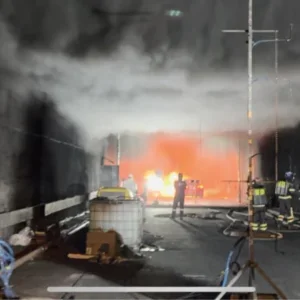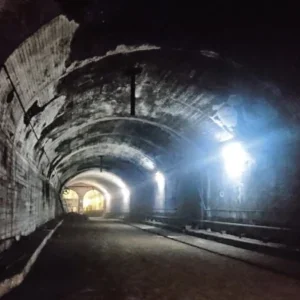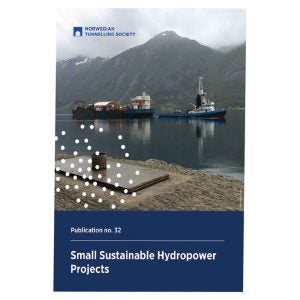The Scottish university system afforded a "narrow escape from quantity surveying" for the young Bob Ibell, who confesses to making a mess of his A Levels. Higher education in the northernmost part of the UK runs a year behind the rest of the country, and a foundation year gave him the opportunity to catch up with his peers at Aberdeen University and qualify with a BSc in Civil Engineering.
"I wanted a fair degree of outdoor life," says Ibell "and I took some advice from my father, who was a teacher not an engineer, and we settled on engineering as the path for me."
After university, during the late 1960s, the major work in the UK was in nuclear power. Taylor Woodrow appeared the most attractive to Ibell, and he joined its construction division in 1967.
The move to tunneling
One of Ibell’s early forays into underground construction was at Heathrow Central Station in west London. The station structure has an unusually thick (2m) roof slab, which was particularly unusual in those days, but was designed to support the weight of a yet-to-be-built hotel. Ibell was then dispatched to the northeast of England because a similar station box was required for the Tyne and Wear Metro. Work constituted 1.6km of largely roadheader-excavated twin tunnels in coal measures and was delivered by the ‘Thyssen- Taywood JV’. It saw Ibell starting work in the Gateshead area in January 1976.
"At Gateshead I was number two to Dai Heycock. He, aided by Maurice Gooderham, BTS regulars, vowed to teach me about tunnelling. I’d almost got the tunnelling ‘bug’ by now, but I did try to break away a little later when everything was quiet."
On hiatus
Ibell left tunnelling briefly in 1982 in favour of the oil industry, at Taywood Santa Fe. It was a period of very little tunnelling work in the country. Civil engineering as a whole was fairly flat. No experience is bad experience, and this time in the wilderness gave him experience with database principles and knowledge of the Artemis software group.
"This all ended when the bottom dropped out of the oil price – does that sound familiar? The contract got shelved, but I was told: ‘we have a job at Heathrow’. And so I was back, the same place. The place I had left to go to the Tyne and Wear Metro. But by this point of course the project was a lot further on."
Channel Tunnel
Ask many of the experienced tunnel engineers from the UK for a highlight in their career and there is one project that emerges in conversation again and again: the Channel Tunnel. Ibell thinks himself fortunate to have been able to see the whole scheme through.
"It all started in late 1984. It was just before Christmas and I was heading off for the holidays early when I got pulled back for a meeting.
"We were hoping to get the Channel Tunnel and so we sat down and went through the programme."
This was the programme that survived to the end of the project and was the benchmark for work throughout.
Shortly afterwards Ibell went to work for the Channel Tunnel Group; one of the groups that submitted the Channel Tunnel design and build proposal to the government. Ibell was responsible for preparing the tunnelling side of the submission. The submission was successful and he was faced with the decision to stay with the client or join the contractors. He decided to go to the contractors, and was responsible for an awful lot of the early work on the project. Getting the whole thing set up.
"One memory is very clear: sitting down with the French to agree the parameters of the scheme; making a few decisions such as what the service tunnel was going to look like. The only problem was that we were building a rail tunnel and they were building a road tunnel."
There was a lot of support for a road tunnel, especially from UK Prime Minister Margaret Thatcher, but even now a road tunnel under the English Channel is considered highly problematic technically. Largely due to ventilation concerns. But despite the financial problems on the project, the technical achievement has left the UK and France with a modern Wonder of the World.
Final years at Taylor Woodrow
The 1990s saw Ibell working as a resident contracts manager on the Jubilee Line Extension project in London. Work covered the construction of London Bridge Station (for which his later company is named) and the running tunnels associated with Southwark Station. This work included machine-driven tunnels, sprayed concrete linings as well as permanent in-situ linings on tunnels up to 11m in diameter. Additionally expansion of an existing and construction of a new ticket hall called for possibly the largest excavations in London Clay at the time.
After this, he was made a director at the company’s head office and was responsible for tunnelling and foundation engineering. But before long a strategic decision was made by the company to move out of the tunnelling industry and into other lower risk areas of business. And it seemed a number of engineers who had "caught the bug" as Ibell puts it would be looking for new employers.
Appetite for tunneling
The board of Taylor Woodrow did not have the appetite for the contracting game at that time, says Ibell, adding: "we all know contracting is not an easy game. And particularly major contracting where you’re working with one-off clients, ones you don’t have a relationship with. And when you are doing that, it is a risky business. You only have to look at the contractors in the UK market at the moment to see that it is attractive to diversify to take risk out. Taylor Woodrow had five major divisions, and each had their day.
The trick is to keep moving. "If you start talking about the overseas market, UK companies have lost a whole load of money. Boards in our country do not seem to have the appetite; they want a company that acts in a responsible manner. They are not prepared to get in to the ducking and diving that you need to do contracting all over the world.
"Foreign companies that have success abroad tend to need a solid home market, with a more or less guaranteed share of the work to take the risk abroad."
Consultancies, Ibell points out, do not suffer from the risk quite so much as they sell their expertise rather than taking on a lot of risk.
London Bridge Associates
Following the Taylor Woodrow announcement, Ibell and his colleagues were sitting in an office above a tapas bar in Central London and conversation drifted from their futures to the problems of contracting in a boom-bust pipeline of work environment. The idea of banding together and selling their skills as a group emerged. They completed the extant Taylor Woodrow contracts, and Taylor Woodrow made no effort to block or hinder the gathering of the new group of engineers.
"We were setting out to sell our skills across the entire construction cycle of a project," says Ibell, "which is funny because as contractors we were always of the view that consultants never added value. So almost as a founding pledge we decided to only work where we could add value. And in fact we make a point of telling clients when we think there is nothing more we can add to a project."
The new company took a lot of convincing for some people, but the idea of not being at the whim of anyone, and not being at the whim of the industry cycle was appealing to the initial team of seven. All of which had been contractors for many years and knew the feast-famine cycle well.
Funding and initial setup
Rather than going to the bank and borrowing the necessary funding, the newly formed LBA all committed up to GBP 3,000 to cover initial expenses and then worked three months for free. At the end of this point they agreed on a couple of the group to become directors, someone became secretary, and an organisational structure was set up that could be taken forward.
"This was June 2000. We drafted employment letters to ourselves, issued share certificates and got the company away. We tried to make certain to never come to a point where we had arguments. We agreed the main purpose of the company was to provide work, rather than making lots of money for ourselves. We set the company up so that you cannot own shares unless you are actively working. As someone retires, they have to sell their shares."
At the start of the journey, the seven or eight major shareholders owned the whole company. Now 41 shareholders own a portion of LBA, but the nonmajors own 51 per cent of the business.
There are three major shareholders left. Ibell adds: "A universal bonus is paid to all employees too. Everyone has a contribution to make, and if they are not then management is also to blame."
Distinct approach
An integrated approach, says Ibell, is something that some clients see the benefit of, while others do not. LBA likes to put people within client teams – indeed most of the company’s work is within client teams – which allows a client to put together a top team, but not necessarily have to keep that team together at all times.
As for an offering; generally construction planning is considered LBA’s specialism, at least among the engineers (while clients think of LBA as construction supervisors according to Ibell).
"We recognised a while ago that when you’re doing construction planning, the first thing anyone wants to know is what it’s going to cost. So you need to be able to put together a cost estimate. Now that is a very different skill to putting together a tender, and I think we have a unique way of doing it. It’s gained us a lot of credibility and we often get asked in to either do the costs or check the costs.
"Basically it is method-based. As soon as we get beyond a very broad outline, we want to have the method there, and then we cost the method. You cannot just look at a similar job from 10 years ago and then slap some inflation on it, or adjust your costing based on length.
You have to price the programme, the risks, the staff, the materials. It is not too difficult to price an amount of concrete, but getting the whole picture is more challenging.
Ibell says that a lot of people did not understand some of these ways of doing business in the early days, and that even today there are people who do not quite get them.
"Someone I know was looking at the HS2 costs, and made the comment that they were too detailed to be correct. Ironic. And when we were starting out, construction planning was a little method statement, which was then passed to a consultant who had done a little site work and a little site supervision. It was all very low key.
"But once we had done it a couple of times, clients started asking for it. It does not matter if they understand it or not, it stands on its own; it is supportable. And when you get a discussion, as there has been on the Thames Tideway project, you have to justify every single point. And if you are wrong, the client and scheme can be in serious trouble. It is very important to be right."
The future
Spreading into new areas or new disciplines is unlikely for the company; the leadership has decided what they are good at. As for where changes will come from, Ibell expects the development will come from developing CDM, fire safety, the usage of BIM and Tunnel Information Management (TIM). Specifically he expects improvements in the thinking around and the use of such tools, rather than development in the tools themselves (see reflections on industry box).
Ibell has hopes that new people, especially young engineers will continue to impress. But of the established hands, he says David Sharrocks, Harry Glennie, Terry Crabb, John Keys, Frank Ellis, Bob Allen, Simon Morgan, Ken Spiby, Steve Thompson and Dave Terry are all names that have really taken the company forwards. As for Ibell, he is winding down his workload, but not ready to retire just yet.
"I get to pick and choose the jobs I enjoy; which is pure consulting work basically. And helping the company internally where I can. Mostly I consult on insurance claims, or anything else that really gets the mind going and you can pass off some of your experience.
"At this stage in a career, when a problem comes along you tend to understand more of the issues behind it, you recognise other problems that you have wrestled with in years gone by; you have seen things that work well and things that haven’t, and you can bring that experience. That is what I enjoy"
Reflections on the industry
"There have been a few changes in my career:
- A major one is the growth of subcontracting. When I started out we employed our own labour. As a young engineer I had to actually understand the outputs; I had to set and propose bonus targets, I had to actually compile a bonus sheet and justify that at the end of the week as well as my normal setting out, quality control and planning work. You were really a ‘Jack of All Trades’ in those days. Today things are a lot more specialised in terms of what an engineer does. They will tend to have a narrower area of responsibility. Although there is a lot more form filling, be it computerised or paper. And of course, the engineer of today has a lot more safety responsibility.
- We are safer; there are fewer fatalities. There is a lot more detailed attention to health and safety, but it is interesting to contemplate whether it is a change in attitudes that has resulted in this improvement, or if it is the restrictions and fail safes that we have built in to construction that have achieved this.
- We spend a lot more time on pre-working these days and a lot less time actually building. It makes it even more difficult in many ways for contractors to work because there’s a long lead-in time when they don’t know if they’ve got the job or not. So they could have a massive peak in demand, or maybe they won’t. We are still trying to sort that out today.
- One way in which we have gone backwards as an industry is that there is less muscle, less of a voice speaking out for the labour force these days. This is because of the way the industry has developed, the way it has moved responsibility for looking after the workforce downwards rather than upwards. The main contractors are not particularly interested; it is a concern of the subcontractors, but they are not so powerful and have less sway.
- Another loss to the industry is a sense of pride in engineering of itself, for itself. The same applies for tunnelling. Tunnelling used to be a sort of bug we would get, but it’s an unfortunate situation that, with the best workload we’ve had in years (which is fantastic) suddenly everyone wants to be in tunnelling just because there are good rewards to be had. Not because they really like the buzz of tunnelling. It is still special, but I think it is becoming more just another part of civil engineering. Which I think is a shame. There is less interest in someone’s opinion and judgement, and more concern as to whether they have signed a form."
Advice for young engineers
"At one point in my career, I suddenly had a moment of understanding. A realisation that I could make a difference, and that people will listen to me if I have something to say. "How do you have something to say? You have to read, to learn, to think about a comment yourself so that when it comes up you have something informed to say. If people sit in silence they never learn and never contribute.
"And listen to people who have an opinion. I stood up in Taylor Woodrow and said: "we have to change or we are in trouble". And sure enough a year later we were in trouble. That situation stuck with me."






